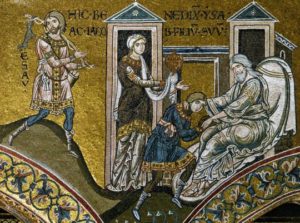13 March OS 2018: Monday of the Sixth Week of Lent; S. Nicephorus of Constantinople
The first reading at Vespers today is Genesis 27:1-41, which recounts how Jacob took Esau’s blessing by deceiving his father Isaac.
Jacob’s deception offends our sense of fairness. Yet by this deception Jacob becomes the ancestor of the God-Man. He burns with desire to receive God’s blessing, by whatever means, and thereby he becomes the instrument of God’s will to save us.
Jacob’s unfairness does not have to meet our approval before inspiring us to emulate his zeal. He demonstrates absolute faith that his father’s blessing will convey irresistible divine power. He believes without doubting that Isaac’s words convey a permanent grace: once Isaac speaks them, he cannot take them back. He burns with desire, with a divine eros, to have this blessing, and God rewards his fervor with His grace.
Esau, by contrast, in an earlier incident, has already demonstrated his lack of zeal for divine things and greater desire for earthly pleasure, when he sold his birthright to Jacob for one hot meal. He has also demonstrated his love of pleasure and disregard of God’s Law by running after loose women. By preferring the things of earth to the things of heaven, he has lost both his birthright – the right to be and to be called a son of God – and his blessing – the grace of God.
Each of us must ask himself whether he is a Jacob or an Esau, whether he prefers heaven or earth. Of course, the answer is that we are both: we waver and undulate; we are hot one day and cold the next. But we should take heart from Jacob’s example: If we want divine blessings, we have only to ask for them. When is the last time we asked for such gifts as
– the love of prayer?
– zeal for heavenly things?
– constant remembrance of death and God’s judgment?
– the grace to see and remember all of our sins and to make a good confession?
– the grace of perseverance in the Faith and repentance until death?
Let us entreat the Lord to ignite our hearts with the divine eros that sets apart the saints. He waits for us to ask, and, desiring with His own divine desire, He desires to give.
“…this one thing I do, forgetting those things which are behind, and reaching forth unto those things which are before, I press toward the mark for the prize of the high calling of God in Christ Jesus (Philippians 3:13-14).”

